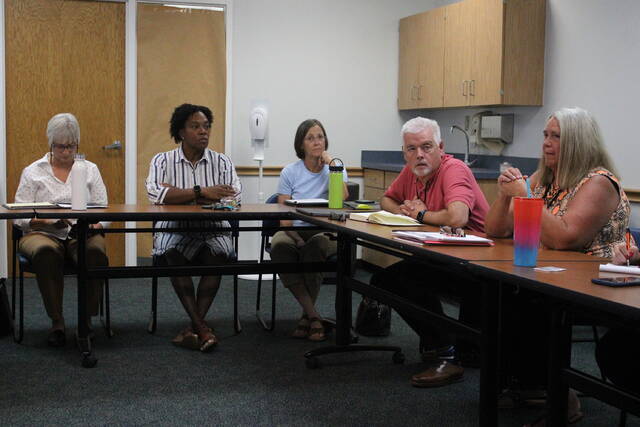
The Richmond County Drug Endangered Family Task Force convened on Wednesday to discuss ways to combat the opioid crisis in Richmond County.
Matthew Sasser | Daily Journal
ROCKINGHAM — The Drug Endangered Family Task Force in Richmond County convened Wednesday afternoon for their first in-person meeting since the pandemic.
Deputy Director of Social Services and DEFT coordinator Theressa Smith provided information on three grants, totaling $150,000, that will go directly toward serving Richmond County residents. All three grants have already been approved by the Richmond County Board of Commissioners.
Samaritan Colony will serve at least 15 clients, but likely more, who will be able to go through in-patient treatment at their facilities for no cost. Recovery support, including opportunity for transitional housing and employment assistance will be available.
“In addition to the treatment, there is aftercare as well,” added Development Director Maggie Sergio.
The second recipient, North Carolina Cooperative Extension, will be doing some additional programming at middle schools in Richmond County Schools. As part of their $50,003 grant, they will also be facilitating some smaller cohorts of students and their families for ten sessions to provide more intensive support and education. The Extension will also put on two community events.
Through the third grant, peer-support services will continue through FirstHealth of the Carolinas. Smith said that with the the $26 billion that North Carolina received, and the $8.7 million that Richmond County received as part of a settlement to bring relief to communities impacted by opioids, that some existing funding was halted.
“We will continue the work that we started, that has been on for over four years,” said Stephanie Heck, peer-support coordinator at FirstHealth. “We have peer support services, we have certified alcohol and drug counseling services.”
Heck added that their medication for opioid use disorder (MOUD) clinics will continue to be available for individuals at no cost.
“We’re able to give grants and vouchers to people who would not be able to afford this service any other way,” Heck said, sharing that they’ve been able to serve well over a hundred people through this service.
Voting members of the DEFT reviewed eight applications from community organizations, ultimately choosing the three above.
“We picked three different areas that we’ve been talking about in the force and gathering data for and these were needs that we were already aware of and wanted to target,” Smith said.
All recipients will put forward a 10% match of their grant money, and each recipient will have a member of their organization join the DEFT. Voting members of the DEFT will monitor the funds in two separate rounds across six months. After the six months, the second half of the allocated funds will be distributed. Richmond County Social Services Director Robby Hall said they’ve modeled the monitoring format from their partnership with the Juvenile Crime Prevention Council.
It’s anticipated that their will be another round of grants that individuals and organizations can seek in the new calendar year.
In July, the Richmond County Board of Commissioners approved $58,000 to increase the available supply of Narcan (name brand of opioid-antidote naloxone) in the county. It will be distributed to local law enforcement and rescue squads. Last week, Steve’s Wings held their third annual overdose awareness rally and vigil for friends and family who have experienced loss as a result of opioids.
During the meeting, Richmond Observer Editor William Toler, a voting member of the DEFT, noted that the most recent update from FirstHealth EMS Richmond Director Buddy Williams indicated that there were 78 responses requiring Narcan in January of 2023 — as much that was needed in January, February and March combined from the year before.
Hall said that with the large increase in the supply of Narcan in the county, they hope to have around 10,000 dosages available in the county. He added that with the wider distribution around the county, they hope to have more accurate numbers and capture a wider data-set regarding local opioid use.
“We need to make sure that each of the [agencies] receiving the Narcan…are turning in those numbers so we can keep up with inventory and the number of Narcan being used so we can keep making the case for the need in our community,” Hall said.
Toler additionally referenced a report from the Office of the Chief Medical Examiner examining the number of fentanyl-positive deaths in North Carolina in 2022. Richmond County had the highest rate of fentanyl-positive deaths at 76.7 per 100,000 residents. In total, Richmond County had 34 deaths. The average statewide death rate is 30.1. All data from this report is considered provisional.
Smith added that since some of the funding for Narcan and harm-reduction kids has ended, she anticipates that these numbers may rise.
“If we’re already number one in the state or last in the state, whichever we want to call it, and that’s with the services that we had available, now with those services unavailable, what is that going to look like?” she asked.
Two additional grants
Smith said that two other grants that the DEFT applied for recently were also approved, both for $25,000.
From the first grant, there will be a fourth iteration of Pride surveys for ninth and eleventh graders in RCS, and it will now include data from seventh graders. Pride surveys anonymously gather information from students regarding their knowledge of access to drugs, whether they’ve experimented with drugs or what they’ve observed other students doing.
Via the second grant, there will be advertising for the ‘Lock Your Meds’ campaign. Advertisements will be in local media, as well as on pharmacy bags at Medical Center Pharmacy. There will also be some future events partnering with Alcohol and Drug Services, such as the ‘Hidden in Plain Sight’ trailer which brings awareness to drug prevention.
Additionally, there will be training for staff and students at Ashley Chapel Education Center from a range of evidence-based programs that will be appropriate for the different age groups at the school.
Additional notes from the meeting
• Samaritan Colony anticipates that their new women’s facility will be completed within the year, and they may be able to provide services at the new center by the end of 2024. Sergio noted that the trusses went up earlier this week.
• Robby Hall stated that if any individual is interested in getting access to Narcan, they can visit the DSS office and get all of the necessary information and training needed to access this service. Narcan is also available via Alcohol and Drug Services.
• Stephanie Heck emphasized that Narcan has saved hundreds of lives in the county, and was worried that with all of the opioid money coming into counties across the state, that Richmond County will have an adequate supply. Hall responded that they don’t have a back order yet. It was stated the generic brand of naloxone, which can be 50% cheaper, will be out of supply quicker than the name-brand Narcan. “Definitely get what you can,” Heck said.
• The next meeting of the DEFT will be on Sept. 22 at DSS at 2:00 p.m.
To support the Richmond County Daily Journal, subscribe at https://www.yourdailyjournal.com/subscribe or 910-817-3111.
Reach Matthew Sasser at 910-817-2671 or msasser@www.yourdailyjournal.com to suggest a correction.



